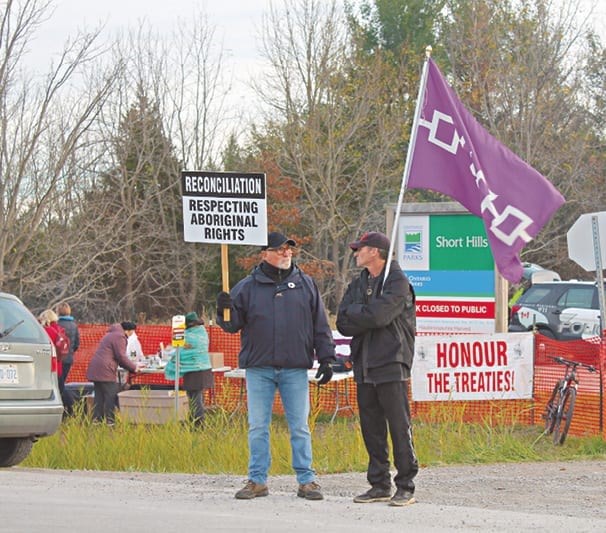BY VOICE STAFF
The First Nation Deer Harvest began on the weekend of November 3 and 4, the first of three provincial Ministry of the Environment, Conservation and Parks-sanctioned hunts in November.
The crisp, cool and damp weather didn’t diminish the spirit of the hunt’s supporters, nor did the handful of protesters also on site.
 Vehicles passed by, honking for both harvest supporters and non-supporters. For the supporting honks, traditional Aboriginal calls of “thank you” were returned. A community fire kept the participants warm as they engaged in conversation.
Vehicles passed by, honking for both harvest supporters and non-supporters. For the supporting honks, traditional Aboriginal calls of “thank you” were returned. A community fire kept the participants warm as they engaged in conversation.
For the past three years, the event has transformed into an opportunity for the Haudenosaunee Confederacy to organize educational workshops on a variety of topics, including ones that answer basic questions about the treaty agreement that permits the hunt, as well as historical facts and issues relating to Indigenous people overall.
For Celeste Smith, co-founder of the Supporters of Haudenosaunee Right to Hunt, these workshops aim to establish a foundation between the Indigenous and their “settler-allies” based upon peace, friendship and respect. This was the mandate of the Two Row Wampum Belt established in 1745 between the Dutch and Haudenosaunee community.
Smith says the harvest aligns itself as closely as possible with traditional methods, including only using archery equipment for hunting. All deer harvested on the first day of the hunt are donated to the Haudenosaunee community’s midwinter ceremony.
She also highlighted that the harvest is an important time to teach youth participants the importance of maintaining native culture and values, patience, respect, and life lessons.
During the hunt itself, hunters can only harvest deer in designated, roped-off areas, and are provided with proper training.
“There are safety measures put into place and it’s very difficult to shoot a deer as the arrows don’t go very far,” Smith said.
Hunters are only able to harvest deer in the southern portion of the park, which has the fewest trails. Park staff monitor access points to make the public aware that the park is closed for public safety.
The harvest is in respect to Aboriginal and treaty rights, as recognized and affirmed under the Constitution Act, 1982, and is committed to meeting the province's constitutional and other obligations regarding First Nation and Metis people.
As in the past, members of the Animal Alliance of Canada were on site, protesting the event. Various signs stating “Ministry of No Respect,” “Shame,” “Stand Behind the Deer,” “Wounded and Left to Suffer 2017,” and “Ministry of Lies” were displayed as the protesters stood alongside Pelham Road.
The group makes its presence known at 4:30 AM when the hunters begin arriving and again 4:30 PM when they begin leaving.
Members from the group refused to comment on why they were present, asserting that past Voice coverage about the hunt had not been accurate.
On the opposite side of the entrance to the park were the deer harvest supporters, and an interactive dialogue session on Animal Liberation and Indigenous Justice.
The workshop discussed the perspectives of animal rights activists who support the Haudenosaunee right to hunt, and how this perspective fits with the animal rights movement more generally.
Dael Horhota of Hamilton, Rose McCormick of Niagara, Stephanie Piovesan of Calgary, and Taylor Telford of St. Catharines were the dialogue leaders.
The topics discussed were species hierarchy, animal culture as an argument for granting animal rights, environmental racism, and access to food and the connection between human and non-human animal oppressions, with an underlying message of how capitalism and colonialism “ruin the party.”
Horhota said that she was in support of the hunt as the Indigenous have a different relationship with animals. “Because of that, their relationship should be respected instead of us imposing a belief based on moral context.”
Piovesan says that animal and human oppression are similar in the sense that certain types of people and animals are valued at different levels in a hierarchy concept.
“Certain animals such as pets, majestic animals, and dolphins are put higher than other animals, such as chickens cows and pigs,” she said. “That’s the type of hierarchy being put into place by western culture.”
Telford said when people protest a treaty right or crucial cultural activity, in this case the deer harvest, they are contributing to colonialism, the same system that oppresses animals.
She also says that it’s important for people to understand that every living thing is part of a symbiotic system and, “Nobody is smarter than Mother Nature. [The protesters] over there don’t understand this concept.”
Because of the harmonious relationship between the Aboriginals and the animals, McCormick said it was actually “more vegan to support the hunt as the relationship is more in line with animal liberations.”
Steve and Fred, who only wanted to be identified by their first names, said they supported the hunt and in turn supported Indigenous people.
Steve said rights for treaty and religious ceremonies are things he supports, as Aboriginals were historically oppressed by the settlers.
“Why it is opposed, it’s unfortunate, but everyone has a right to their opinion.”
Fred keeps the “community fires” during the interactive dialogue sessions as part of his recovery program. For him, he says keeping the fires connects him with Mother Earth as he heals from post-traumatic stress and addiction issues.
Celeste Smith said, “The harvest shows respect to the indigenous people after many years of repression. They deserve this and as much respect as we can give them.”
The deer harvest will continue this weekend, November 17 and 18, and finish November 29 and 30.
The hunts will also feature on-site educational sessions on topics including “Canadian Mining and Indigenous Rights,” “Faith Communities Consider Reconciliation,” “Be the Change! Anti-Racism and Decolonization as Best Practices,” discussion of the treaties, and “The Clothing of our Grandmothers.”



